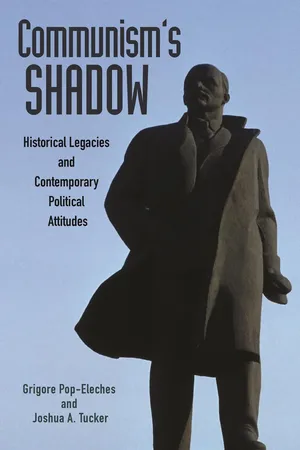
Communism's Shadow
Historical Legacies and Contemporary Political Attitudes
Grigore Pop-Eleches, Joshua Tucker
- 344 Seiten
- English
- ePUB (handyfreundlich)
- Über iOS und Android verfügbar
Communism's Shadow
Historical Legacies and Contemporary Political Attitudes
Grigore Pop-Eleches, Joshua Tucker
Über dieses Buch
It has long been assumed that the historical legacy of Soviet Communism would have an important effect on post-communist states. However, prior research has focused primarily on the institutional legacy of communism. Communism's Shadow instead turns the focus to the individuals who inhabit post-communist countries, presenting a rigorous assessment of the legacy of communism on political attitudes.Post-communist citizens hold political, economic, and social opinions that consistently differ from individuals in other countries. Grigore Pop-Eleches and Joshua Tucker introduce two distinct frameworks to explain these differences, the first of which focuses on the effects of living in a post-communist country, and the second on living through communism. Drawing on large-scale research encompassing post-communist states and other countries around the globe, the authors demonstrate that living through communism has a clear, consistent influence on why citizens in post-communist countries are, on average, less supportive of democracy and markets and more supportive of state-provided social welfare. The longer citizens have lived through communism, especially as adults, the greater their support for beliefs associated with communist ideology—the one exception being opinions regarding gender equality.A thorough and nuanced examination of communist legacies' lasting influence on public opinion, Communism's Shadow highlights the ways in which political beliefs can outlast institutional regimes.
Häufig gestellte Fragen
Information

Country Code |
Country |
AL |
Albania |
AM |
Armenia |
AZ |
Azerbaijan |
BA |
Bosnia-Herzegovina |
BG |
Bulgaria |
BY |
Belarus |
CZ |
Czech Republic |
DE |
East Germany |
EE |
Estonia |
GE |
Georgia |
HR |
Croatia |
HU |
Hungary |
KG |
Kyrgyzstan |
LT |
Lithuania |
LV |
Latvia |
MD |
Moldova |
MK |
Macedonia |
PL |
Poland |
RO |
Romania |
RS |
Serbia |
RU |
Russia |
SI |
Slovenia |
SK |
Slovakia |
UA |
Ukraine |

